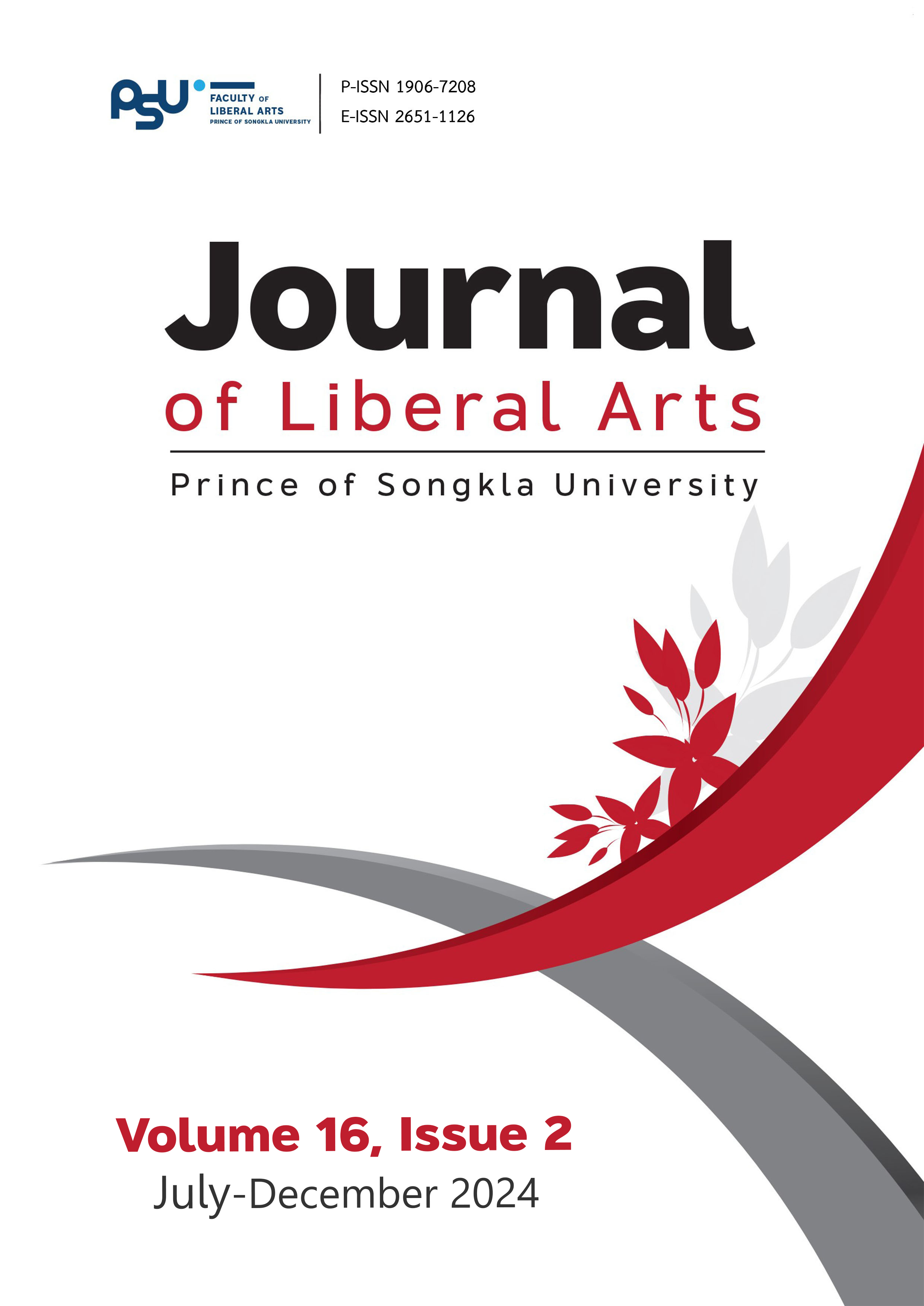The Development of a Database for Tai Yai Cultural Tourism in the Border Area at Lak Taeng Checkpoint, Piang Luang Sub-District, Wiang Haeng District, Chiang Mai Province
DOI:
https://doi.org/10.14456/jlapsu.2024.19Keywords:
Tai Yai, Lak Taeng Checkpoint, Cultural Tourism DatabaseAbstract
The objective of this research was to gather information and knowledge pertaining to the beliefs, history, legends, and other relevant aspects of tourist attractions in the border area at Lak Taeng Checkpoint, Piang Luang Sub-district, Wiang Haeng District, Chiang Mai Province. The target group in this study consisted of nine community leaders and 46 local individuals. Data collection involved a questionnaire survey, unstructured interviews, and a focus group interview. The collected data were then analyzed using descriptive statistics, namely frequency distribution, percentage, mean, and standard deviation. The content validity of the results were determined using the index of objective congruence (IOC). The findings of this research revealed that Tai Yai cultural tourist attractions, including architectures, fine arts, paintings or sculptures, reflect Tai Yai history, beliefs, roots, local wisdoms, and ways of life. Furthermore, this study unveiled the profound influence of Buddhism on local culture and traditions, as well as the community’s unique identity, potentials, and strengths. The IOC results suggested that all the items evaluated, including content, language, and appropriateness, achieved scores greater than 0.50, and therefore, deemed appropriate for dissemination. The findings were shared with Tai Yai cultural tourism authorities, and Piang Luang Sub-district Administrative Organization to inform their tourism strategies. This information has also been made available through thaitourstudy.com. The main finding implication is that a comprehensive database can be used to attract a broader audience. Moreover, community members should continuously share and develop the information to increase the visitors and create more jobs and careers in the community.
References
Boonprasert, S. (2020). Community-based tourism on the learning routes. Retrieved from http://www.culture.go.th/culture_th/ewt_news.php?nid=4812&filename=index
Center for the Promotion of Art Culture and Creative Lanna, Chiang Mai University. (2022). Fon Nok Ginggala. (in Thai) [Ginggala birds dancing] Retrieved from https://www.matichonweekly.com/column/article_585229
Chiangmainews. (2018). “Wiang Haeng” to Chiang Mai trade checkpoint: Neighbors are not ready, but Chinese capital is waiting to get involved. Retrieved from https://www.chiangmainews.co.th/page/archives/797956
Chomphoothong, P., Visespra, P., Charoensuk, C., Swangngam, N., & Sugsamrit, J. (2022) Exploratory Factor Analysis on Tourism Attraction Affecting on Intention to Visit the Agro-Tourism in Prachuap Khiri Khan Province. Journal of Business Administration and Social Sciences Ramkhamhaeng University. 51), 36-52. Retrieved from https://so02.tci-thaijo.org/index.php/ibas/article/view/254904
Dailynews. (2024). Ruampon Yonnok-Chomtoh Witi Taiyai haeng Mae Hong Son. (in Thai) [Watch Nok and Toh, Life Living of Tai Yai, Mae HongSon] Retrieved from https://www.dailynews.co.th/news/3358285/
Department of Cultural Promotion. (2019). Ginggara-Toh. (in Thai) [Ginggara-Toh mythical creatures] Retrieved from http://article.culture.go.th/index.php/layout-modules-positions/3-column-layout-2/152-2019-07-26-06-37-42
Duangsri, Y., & Wisetprapa, P. (2021). Deciding on cultural tourism in Nakhon Phanom Province of the population in Bangkok and surrounding area. Retrieved from https://mmm.ru.ac.th/MMM/IS/vlt15-2/6114993208.pdf
Fine Arts Department. (2019). Buad Lookkaew rhue Poy Sang Long. (in Thai) [Buad Lookkaew or Poy Sang Long] Retrieved from https://www.finearts.go.th/chiangmaiarchives/view/33576-บวชลูกแก้วหรือปอยส่างลองประเพณีบวชลูกแก้วหรือที่ชา
Foreign Affairs Division, Office of the Permanent Secretary for Interior. (2023). Saroob Chongtangpan Danthai kub Prathet Peunban. (in Thai) [Summary of Checkpoints of Thailand and Neighboring Countries] Retrieved from http://www.fad.moi.go.th/images/กพบ/สรปชองทางผานแดนไทยกบประเทศเพอนบาน_070766-2.pdf
Klangrahad, J. Tongteerapab, W. Jongklaijak, T., & Intanin, P. (2017). The success factors of agrotourism development by using innovation and technologies: a case of the little garden, Wangnamkeaw District, Nakhonratchasima Province. Retrieved from https://conference.kku.ac.th/colaimg/files/articles/3c5fe-o-59-.pdf
Komarakul Na Nakorn, T. (2012). Piang Luang rawhang khetdan lae wan kheun tee yuenyad (in Thai) [Piang Luang between the boundaries and days and nights that endure]. Retrieved from https://travel.kapook.com/view38188.html
Ministry of Tourism and Sports. (2013). Sentang karn derntab Somdet Phra Naresuan Maha Raj khuang plubpla Phra Naresuan Maha Raj Ampeu Wiang Haeng Changwad Chiang Mai. (in Thai) [The route of King Naresuan the Great, the palace of King Naresuan the Great, Wiang Haeng District, Chiang Mai Province]. Retrieved from https://thailandtourismdirectory.go.th/th/attraction/22231
Narata, P. (2016). Poy Sang Laong Wiang Haeng akekalak khong chao Tai Yai. (in Thai) [Wiang Haeng Poy Sang Long, Tai Yai identity]. Retrieved from https://erp.mju.ac.th/acticleDetail.aspx?qid=532
Niyomwong, T., & Plaiklang, S. (2017). Research systhesis. Retrieved from https://news.rbru.ac.th/attach/2021-08-18-99207.pdf
Nuamna, R. (2023). Poy Sang Long. (in Thai) [Poy Sang Long] Retrieved from http://www.facebook.com/ratchanon.noamna
Piang Luang sub-district administrative organization. (2023). Pan pattana tongtin ongkarn boriharn suantumbon Piang Luang Ampeu Wiang Haeng Changwad Chiang Mai. (in Thai) [Piang Luang sub-district administrative organization improvement plan 2023-2027].
Chiang Mai: Piang Luang sub-district administrative organization.
Phophet, W. (2019). Factors influencing the travailing decisions to historical of Thai visitors: A case study of Ayutthaya Historical Park. Retrieved from http://dspace.bu.ac.th/bitstream/123456789/4548/3/wanasnan_phop.pdf
Sukdanont, S. (2018). Study of utilizing coastal shipping in a modal shift for Thai-Myanmarese cross-border trade and transport. Retrieved from http://www.cuti.chula.ac.th/triresearchlibrary/2561/Ranong-Myanmar%20Final%20Report%20l@03226018.pdf
Tanongsak, W., Sittisak, O., & Khunpitak, C. (2022). Database management platform for creative tourism: A Case study of Pak Bara Community. Inthaninthaksin Journal, 17(2), 9-34. https://so02.tci-thaijo.org/index.php/HUSOTSU/article/view/258936
Thammati, S. (n.d.) Fon Ginggara. (in Thai) [Ginggara birds] Retrieved from https://www.gotoknow.org/posts/263623
The Office of the Permanent Secretary, Ministry of Tourism and Sports. (2020). Review Praden Garn Songserm Garn Tongteaw Doaw Chumchon. (in Thai) [Review Community Based Tourism Issue] Retrieved from https://secretary.mots.go.th/ewtadmin/ewt/ga/download/article/article_20200416204840.pdf
Wongpattanasiri, P. (2019). Sustainable community-based tourism. Retrieved from https://www.nectec.or.th/ace2019/wp-content/uploads/2019/09/20190909_SS02_Patthamas.pdf
Downloads
Published
How to Cite
Issue
Section
License
Copyright (c) 2024 Pattaragamol Ruksuan

This work is licensed under a Creative Commons Attribution-NonCommercial-NoDerivatives 4.0 International License.
The authors retain the copyright to their article but the Journal of Liberal Arts, Prince of Songkla University reserves the exclusive rights to first publication.






